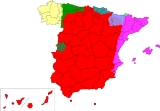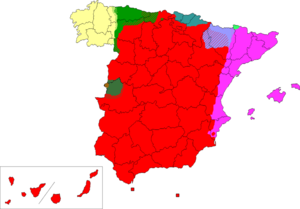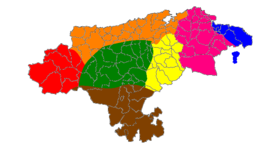
Cantabrian language
Encyclopedia
Cantabrian or Montañés is the name given to the indigenous language of Cantabria
, Spain
and especially to the variety most distinct from standard Castilian
.
, and in nearby mountain regions of the provinces of Burgos
and Palencia
. Within Cantabria
, the dialect is spoken in the west and some zones of the Valley of Pas and the Valley of Soba in the east.
It is a transition language that can be considered either a dialect of Asturian
, an ancient dialect of Castilian
, or an independent Romance language
in its own right.
Cantabrian has two subdialects: Western and the Eastern. The dividing zone between the variants is between the Saja River and the Pas. Pas dialect is the Eastern variant with the particularity of being specially well preserved.
Cantabrian was listed in the UNESCO
Red Book of the World’s Languages in Danger in 2009, in the Astur-Leonese linguistic group as a definitely endangered language
.


Na, que entornemos, y yo apaecí esturunciau y con unos calambrios que me jiendían de temblíos... El rodal quedó allá lantón escascajau del too; las trichorias y estadojos, triscaos... Pero encontó, casi agraecí el testarazu, pues las mis novillucas, que dispués de la estorregá debían haber quedau soterrás, cuasi no se mancaron. ¡Total: unas lijaduras de poco más de na!
Castilian
Nada, que volcamos, y yo acabé por los suelos y con unos calambres que me invadían de temblores...El eje quedó allá lejos totalmente despedazado; las estacas quebradas... Pero aún así, casi agradecí el cabezazo, pues mis novillas, que después de la caída deberían haber quedado para enterrar, casi no se lastimaron. ¡Total: unas rozaduras de nada!
Cantabria
Cantabria is a Spanish historical region and autonomous community with Santander as its capital city. It is bordered on the east by the Basque Autonomous Community , on the south by Castile and León , on the west by the Principality of Asturias, and on the north by the Cantabrian Sea.Cantabria...
, Spain
Spain
Spain , officially the Kingdom of Spain languages]] under the European Charter for Regional or Minority Languages. In each of these, Spain's official name is as follows:;;;;;;), is a country and member state of the European Union located in southwestern Europe on the Iberian Peninsula...
and especially to the variety most distinct from standard Castilian
Spanish language
Spanish , also known as Castilian , is a Romance language in the Ibero-Romance group that evolved from several languages and dialects in central-northern Iberia around the 9th century and gradually spread with the expansion of the Kingdom of Castile into central and southern Iberia during the...
.
Description and dialects
According to various criteria, Cantabrian may include varieties spoken in various parts of Cantabria, in the border areas of BiscayBiscay
Biscay is a province of Spain and a historical territory of the Basque Country, heir of the ancient Lord of Biscay. Its capital city is Bilbao...
, and in nearby mountain regions of the provinces of Burgos
Burgos
Burgos is a city of northern Spain, historic capital of Castile. It is situated at the edge of the central plateau, with about 178,966 inhabitants in the city proper and another 20,000 in its suburbs. It is the capital of the province of Burgos, in the autonomous community of Castile and León...
and Palencia
Palencia
Palencia is a city south of Tierra de Campos, in north-northwest Spain, the capital of the province of Palencia in the autonomous community of Castile-Leon...
. Within Cantabria
Cantabria
Cantabria is a Spanish historical region and autonomous community with Santander as its capital city. It is bordered on the east by the Basque Autonomous Community , on the south by Castile and León , on the west by the Principality of Asturias, and on the north by the Cantabrian Sea.Cantabria...
, the dialect is spoken in the west and some zones of the Valley of Pas and the Valley of Soba in the east.
It is a transition language that can be considered either a dialect of Asturian
Astur-Leonese language
Astur-Leonese is the generic name for a group of closely related linguistic varieties included in the West Iberian branch of the Romance languages...
, an ancient dialect of Castilian
Castilian Spanish
Castilian Spanish is a term related to the Spanish language, but its exact meaning can vary even in that language. In English Castilian Spanish usually refers to the variety of European Spanish spoken in north and central Spain or as the language standard for radio and TV speakers...
, or an independent Romance language
Romance languages
The Romance languages are a branch of the Indo-European language family, more precisely of the Italic languages subfamily, comprising all the languages that descend from Vulgar Latin, the language of ancient Rome...
in its own right.
Cantabrian has two subdialects: Western and the Eastern. The dividing zone between the variants is between the Saja River and the Pas. Pas dialect is the Eastern variant with the particularity of being specially well preserved.
Cantabrian was listed in the UNESCO
UNESCO
The United Nations Educational, Scientific and Cultural Organization is a specialized agency of the United Nations...
Red Book of the World’s Languages in Danger in 2009, in the Astur-Leonese linguistic group as a definitely endangered language
Endangered language
An endangered language is a language that is at risk of falling out of use. If it loses all its native speakers, it becomes a dead language. If eventually no one speaks the language at all it becomes an "extinct language"....
.


Comparative tables
| Latin | Astur-Leonese | Cantabrian | Spanish | English |
|---|---|---|---|---|
| altum | altu | altu | alto | high |
| quasi | cuasi | casi | casi | almost |
| dicere | dicir | dicir/icir | decir | to say |
| facere | facer/facere | jacer | hacer | to do |
| focum | fueu/fuegu | jueu/juegu | fuego | fire |
| flammam | llama | llama | llama | flame |
| legere | lleer | leyer | leer | to read |
| linguam | llingua | lengua | lengua | language |
| lumbum | llombu | lombu | lomo | loin |
| matrem | madre | madri | madre | mother |
| mirulum | mierbu | miruellu | mirlo | blackbird |
| monstrare | mostrar | amuestrar | mostrar | to show |
| nostrum | nuestru/nuesu | muestru | nuestro | ours |
| tussem | tose | tus | tos | cough |
Sample text
Central CantabrianNa, que entornemos, y yo apaecí esturunciau y con unos calambrios que me jiendían de temblíos... El rodal quedó allá lantón escascajau del too; las trichorias y estadojos, triscaos... Pero encontó, casi agraecí el testarazu, pues las mis novillucas, que dispués de la estorregá debían haber quedau soterrás, cuasi no se mancaron. ¡Total: unas lijaduras de poco más de na!
Castilian
Nada, que volcamos, y yo acabé por los suelos y con unos calambres que me invadían de temblores...El eje quedó allá lejos totalmente despedazado; las estacas quebradas... Pero aún así, casi agradecí el cabezazo, pues mis novillas, que después de la caída deberían haber quedado para enterrar, casi no se lastimaron. ¡Total: unas rozaduras de nada!
External links
- Cantabrian-Spanish Dictionary in the Asturian wiktionary (in Cantabrian).
- Alcuentros, Cantabrian magazine of minority languages (in Cantabrian/Castilian)
- Proyeutu Depriendi Distance learning of Cantabrian (in Cantabrian/Castilian)

